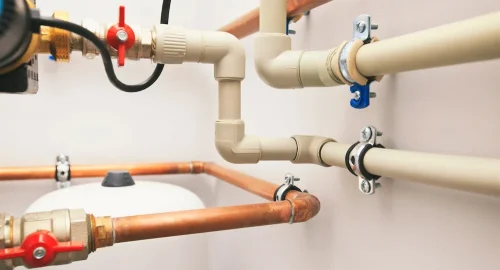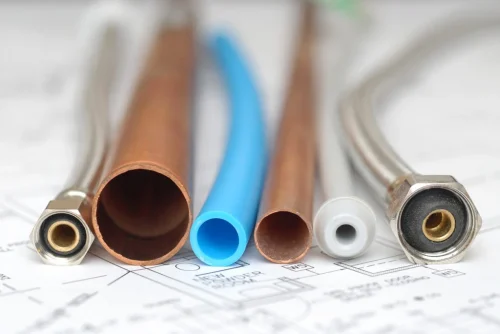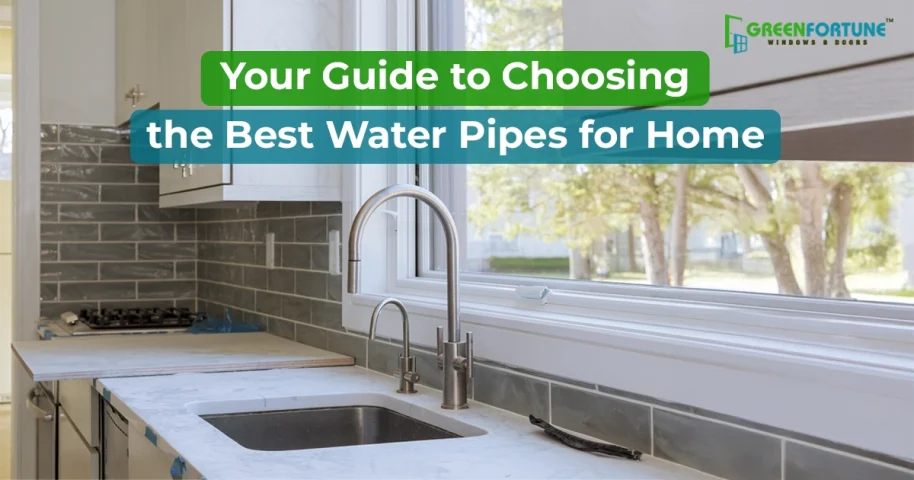
Why are PVC False Ceiling the Best Choice for Bathrooms?
March 15, 2025
The Best Guide to Standard Window Frame Dimensions & Sizes
March 15, 2025Water pipes for house plumbing are essential to your home's functionality, yet they’re often the last thing homeowners want to think about. However, choosing the wrong type can lead to persistent problems like rust, leaks that waste both time and money to fix. Thankfully, modern materials in plumbing options are more advanced and built to address specific needs.
In this blog, we will help you understand why and to choose different types of pipes based on use, water nature, and other key factors to ensure clean water, strong pressure, and fewer repairs.

Source: Express sewer and drain
Table of contents
- Types of Water Pipelines in Residential Plumbing
- Key Factors for Choosing Best Water Pipes for Home
- Different types of pipes for Safe pipework plumbing
- Concluding Your Pipe Selection
- FAQ
Types of Water Pipelines in Residential Plumbing
In residential buildings, there are two main types of water pipelines:
1.For Water Supply: Water supply pipelines carry clean water into the house from the main source. They work under pressure to deliver water to faucets, showers, and appliances.
2.For Drainage: Drainage pipelines remove wastewater from the house to the sewer or septic system. They function without pressure, using gravity to direct water away.
Key Factors for Choosing Best Water Pipes for Home
Selecting the right water pipes for house plumbing system is essential. Here are the factors you should consider:
1. Understanding Your Needs
Each type of water pipe serves a specific purpose depending on its placement and function within the network of water pipes in the house plumbing systems. Some handle high water pressure, while others are better for underground use or carrying hot water. Assessing where and how the pipes will be used helps in making the right choice.
2. Weather & Climate Considerations
Another important aspect to consider while selecting water pipes for house plumbing is how they perform in varying weather conditions. Some materials may expand in high heat, while others could crack in freezing temperatures, which can lead to issues with water flow or quality over time.
3. Water Quality & Corrosion Resistance
Water composition varies by region and affects pipe selection. Hard water with high mineral content causes buildup inside pipes and reduces water flow. Coastal areas with high salt levels accelerate corrosion. Choosing materials that resist these effects ensures long-term reliability.
4. Water Pressure & Flow Efficiency
High-rise buildings or multi-story homes need pipes that withstand increased pressure and pipe diameter plays an important role. Whenever you are choosing water pipes for house plumbing, always select pipes that can handle sudden pressure surges, especially in areas with irregular water supply.
5. Installation & Maintenance
Some pipes are lightweight and easy to install but others require professional installation due to complex fittings or sealing methods. If you are selecting water pipes for a house under maintenance, check thoroughly for water leakage and mineral buildup. Replace them when necessary to prevent future plumbing issues.
6. Budget & Longevity
The material and durability depends on the type of water pipes. Water pipes for house plumbing systems come in different price ranges, but it's important to jointly consider the benefits, pros, and cons before making the decision. Picking the right option based on your needs and budget can help reduce long-term maintenance.
7. Government & BIS Standards
Local building codes regulate plumbing materials to ensure safety and efficiency. Pipes must meet approved quality standards and comply with relevant regulations.
Different types of pipes for Safe pipework plumbing

Source: LEN
A variety of water pipes for house plumbing are available in the market, each offering distinct features related to durability, cost-effectiveness, and functionality. Let's explore:
1. PVC Pipes
If you’re looking for an affordable and low-maintenance option, PVC (Polyvinyl Chloride) pipes are one of the most common choices, especially for cold water supply. They are lightweight, rust-proof, and easy to install. However, they can only handle normal water temperatures, making them unsuitable for hot water lines.
✅ Pros: Budget-friendly, won’t corrode, and are low-maintenance.
❌ Cons: Limited use due to incompatibility with hot water supply.
2. CPVC Pipes (Chlorinated Polyvinyl Chloride)
These pipes are an upgrade over PVC as they can handle temperatures up to 93°C (200°F). When you need both hot and cold water supply, CPVC pipes are an excellent choice among water pipes for house plumbing. They are also more durable and resistant to scaling and useful in areas with hard water.
✅ Pros: Suitable for all household water temperatures and prevents scaling.
❌ Cons: Costs more than PVC, but the added durability makes up for it.
3. PEX (Cross-Linked Polyethylene)
These pipes are a popular choice for their flexibility and ease of installation. They work well for both hot and cold water. Since they can bend around obstacles and tight spaces, they are easy to install and require fewer fittings, which reduces the risk of leaks.
✅ Pros: Super flexible, and they sustain in extreme cold environments.
❌ Cons: Can only be used indoors or in areas not exposed to direct sunlight.
4. Copper Pipes
They are known for their strength, long lifespan, ability to withstand high-temperature water, and resistance to bacterial growth. Copper pipes are also ideal for high-pressure systems, usually found in multi-story buildings.
- ✅ Pros: Tough, keeps water clean, and lasts for decades.
- ❌ Cons: Expensive, and requires soldering for installation.
5. Galvanized Steel Pipes
These pipes were more common in older homes and coated with zinc to resist corrosion, but they aren't the best choice for water pipes for house plumbing solutions in the long run.
- ✅ Pros: Handles high pressure and is durable.
- ❌Cons:: They rust over time as the zinc coating wears off, which can affect water quality and lead to contamination.
6. HDPE (High-Density Polyethylene) pipes
These pipes are commonly used in India for underground water supply lines and borewells. They are resistant to chemicals, can withstand pressure changes and ground movement. These features make them ideal for municipal water supply connections and rural water systems.
- ✅Pros: Tough, long-lasting, and won’t rust or corrode.
❌Cons: It costs high and mainly used for underground or large-scale plumbing.
Concluding Your Pipe Selection
When selecting water pipes for house use, consider whether it's a low-cost repair for a rented space or an investment in long-lasting solutions for owned property. You should also take into account the pipe type, your budget, and how long you need them to last.
If you’re renovating or building a new home, be sure to explore GreenFortune UPVC windows and doors for durable, energy-efficient solutions.
FAQ
1. What types of pipes do apartment builders use for plumbing?
Apartment builders often use CPVC for hot and cold water, PEX for flexibility and easy installation, and PVC for cold water and drainage.
2. How do you decide which type of pipe to use for water supply and drainage in residential plumbing systems?
Different pipe types serve specific purposes in plumbing systems. CPVC, PEX, and Copper pipes are commonly used for water supply, while PVC, HDPE, Stoneware, and Cast Iron are suitable for drainage. HDPE stands out as it supports both water supply and drainage, making it a versatile option.
3. Which water pipe requires the least maintenance and lasts the longest for house plumbing?
HDPE pipes are highly durable, resistant to rust, corrosion, and chemicals, making them ideal for long-lasting plumbing. They can handle high water pressure and ground movements, requiring little to no maintenance for over 50 years.








